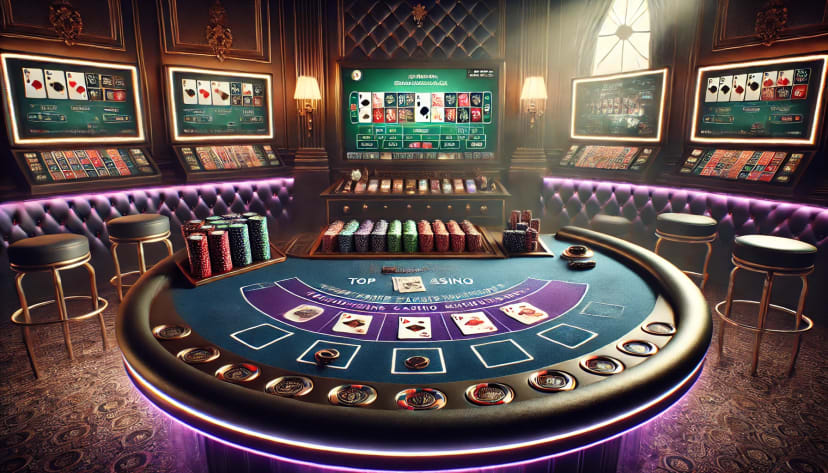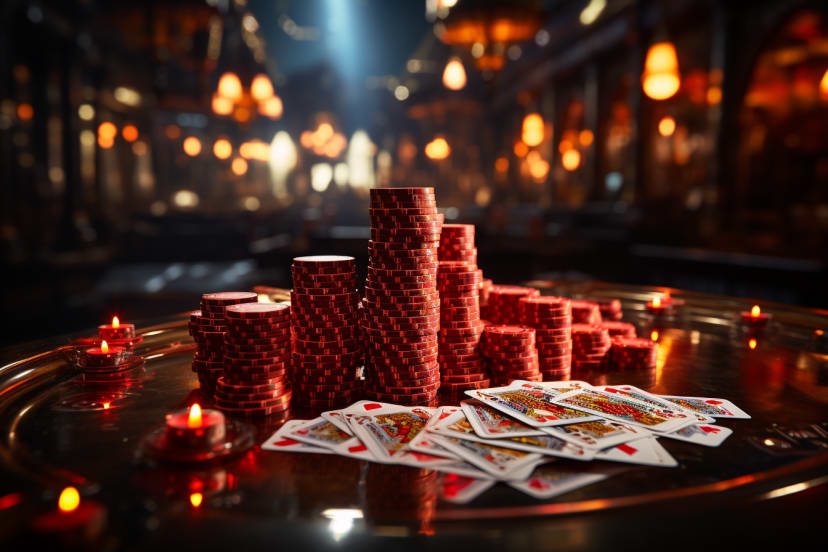Mastering the Double Down in Blackjack: A Strategic Guide

Blackjack, a true classic in the card game arena, is a mainstay in casinos across Singapore, enthralling players at both physical tables and online. This game uniquely blends skill and luck, challenging you to strategically aim for 21 without busting – a thrill that sets it apart from mere chance games. Among skill-based casino games, blackjack, alongside poker, shines with its depth and strategic nuances. For enthusiasts and aspiring pros, mastering techniques like doubling down isn't just a skill; it's fundamental to the game. To guide you, we'll dive deep into the art of doubling down, offering insights and strategies to boost your winning chances. Ready to put this into practice? Explore our top picks at CasinoRank for the ultimate gaming experiences!
So, seize this chance to enter the world of blackjack, sharpen your skills, and discover the exciting realm of strategic casino gaming right here in Singapore!
What is Doubling Down in Blackjack?
Doubling down in blackjack is a heart-pounding strategic move. It's when you, sensing a prime opportunity, decide to double your initial bet on an active hand. This bold play earns you one extra card, after which you must stand – no matter what. While embodying high-risk, high-reward gameplay, this move adds a significant tactical layer to blackjack. Deciding to double down can be a game-changer, potentially doubling your winnings, but it carries the risk of losing your amplified bet if you draw a low card. It's this dance between risk and reward that makes doubling down a thrilling part of blackjack strategy, urging players to make smart decisions based on their hand and the dealer's upcard.
When to Pull Off the Perfect Double Down
Spotting the ideal moment to double down in blackjack is a high-stakes balancing act. It requires a sharp understanding of both your hand and the dealer's possible outcomes. This section aims to simplify the process, highlighting when doubling down can really turn the tide in your favour. It's not just about taking risks; it's about making calculated, smart risks. Knowing when to double down can transform an average hand into a winning one, maximising your payout potential while keeping risks manageable. Stay with us as we explore the scenarios where doubling down could be your best move, elevating your game to new heights.
When is the Best Time to Double Down?
In the world of blackjack, you can only double down after your initial two cards are dealt. Certain key situations offer a significant advantage, turning ordinary hands into potential winners. Let's dive into these scenarios:
Situation #1: You Hold a Total of 11
Having a hand total of 11 is one of the most promising positions for a double down. In this scenario, the odds are in your favor to draw a card that will bring you tantalizingly close to 21. Whether you hit the jackpot with a blackjack, or land a strong hand like 20, 19, or 18, the chances of winning the hand increase significantly. It's a golden opportunity where the risk of busting is minimal, and the potential for a big win is at its peak. Therefore, whenever you find yourself holding a total of 11, seize the moment and consider doubling down to maximize your winnings.
Situation #2: Soft 18, 17, or 16
Soft hands in blackjack—those comprising an Ace and another card—present unique strategic opportunities. An Ace's value flexibility (counting as either 1 or 11) makes these hands particularly valuable. When you're dealt a soft 16, 17, or 18, doubling down can be a smart move, especially if the dealer's face-up card is on the lower side (2 to 6). In these situations, the dealer is more likely to bust, while you have the cushion of the Ace to adjust your total safely. However, it's important to be strategic and not rush into doubling down; assess the dealer's card and your own hand's potential before making your move.
Situation #3: Hard 10 or 9
In contrast to soft hands, hard hands in blackjack do not include an Ace, or the Ace is valued only as 1, removing the flexibility of adjusting the hand's total. When you're holding a hard 9 or 10, the opportunity to double down becomes appealing. This move is most effective when the dealer's face-up card is between 2 and 6. In these cases, the dealer is under pressure to hit in order to reach the standard 17, increasing their chances of busting. So, if your hand is a hard 9 or 10, and the dealer's card is favorable, doubling down can be a savvy way to increase your winnings.
When to Avoid Doubling Down
Doubling down, while a powerful tool, is not always advisable. Recognizing situations where this strategy could backfire is crucial:
Situation #1: Dealer Shows an Ace
If the dealer's face-up card is an Ace, the odds of them hitting a blackjack or a strong hand increase significantly. In such scenarios, doubling down can be a risky gamble, potentially leading to a substantial loss. The dealer's Ace is a strong indicator of their potential hand strength, so exercising caution and holding back from doubling down is often the wiser choice.
Situation #2: Hand Total Exceeds 11
Holding a hand with a total exceeding 11 brings a heightened risk of busting if you choose to double down. The excitement and pace of the game can sometimes overshadow this risk, leading players to make hasty decisions. Instead of doubling down in these situations, it's often better to opt for a hit, aiming to improve your hand while hoping for the dealer to bust. Remember, blackjack is full of unexpected twists, and a conservative approach in these instances can sometimes lead to surprising victories.
Can One Double Down After Hitting or Splitting?
Exploring other common strategies in blackjack, like hitting (drawing additional cards) or splitting (separating a pair into two hands), raises the question: can these be combined with doubling down? Generally, most casinos restrict players from doubling down after hitting, as it would greatly enhance their advantage over the house. Similarly, doubling down after splitting is often not permitted, maintaining the delicate balance of the game's odds.
Conclusion
Blackjack's appeal lies in its complex and unpredictable nature, and the double-down strategy is a testament to this. By mastering when and how to use this technique, you can gain a significant edge over the dealer. However, it's vital to remember that, despite your best strategies, the house edge always looms. Manage your expectations and focus on enjoying the game. For beginners and those seeking to expand their blackjack knowledge, exploring topics like common mistakes or the 'match the dealer' strategy can be immensely beneficial. Embark on your blackjack adventure at one of CasinoRank's recommended casinos, where learning and excitement converge, offering you a world of strategic gaming and potential wins.
FAQ
Does Doubling Down Affect the House Edge in Blackjack?
Strategically doubling down can indeed reduce the house edge in blackjack. By making this move at opportune moments, such as when your hand totals 11 or you have a soft hand against a dealer's weak upcard, you significantly boost your winning potential. When executed correctly, doubling down can subtly shift the odds more in your favour, thereby lowering the overall house edge.
Can I Double Down on Any Hand in Blackjack?
In blackjack, the option to double down is typically limited to your initial two cards. However, specific casinos, including those in Singapore like Marina Bay Sands or Resorts World Sentosa, may have their own unique rules regarding which hands qualify. For instance, some establishments might not permit doubling down on hands that have resulted from splitting pairs. It's always prudent to familiarise yourself with the house rules of the casino you are playing at.
How Do I Signal to the Dealer That I Want to Double Down?
In a physical casino setting, such as those found in Singapore, the standard way to indicate your intention to double down is by placing an additional bet right next to your original wager. This new bet should be equal in value to your initial stake. You can also verbally state your decision to double down. Clear communication is essential to prevent any misunderstandings at the table.
Is Doubling Down Advisable in Online Blackjack?
Yes, doubling down remains an effective strategy even when playing online blackjack. The fundamental rules and optimal scenarios for doubling down are consistent with those in land-based casinos. However, as online platforms can vary significantly, it's always prudent to review the specific rules of the game you are engaging with. Understanding the unique dynamics of the online blackjack variant you choose is crucial for successful play.
What Happens If I Double Down and the Dealer Gets Blackjack?
Should you choose to double down and the dealer subsequently achieves blackjack, you will unfortunately forfeit double the amount of your initial wager. This outcome underscores the inherent risk associated with doubling down, particularly when the dealer's visible card is an Ace or a ten-value card. It highlights the critical importance of carefully assessing the dealer's upcard before making the decision to double down.















